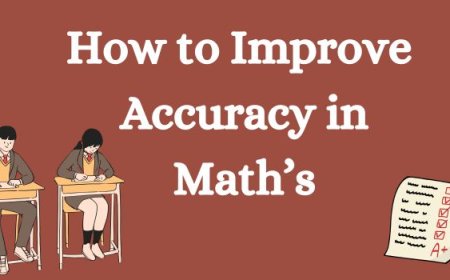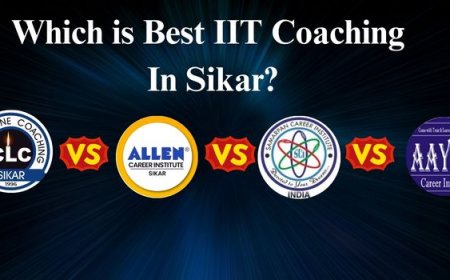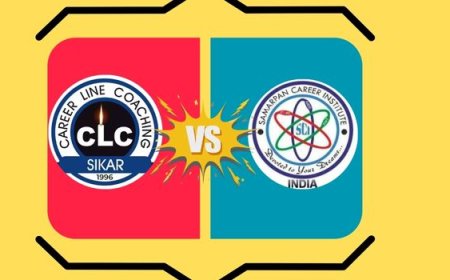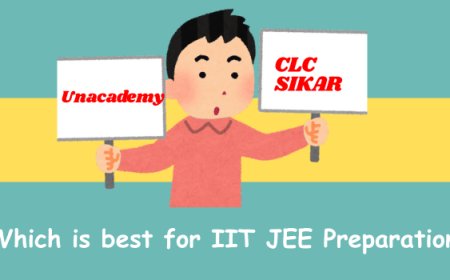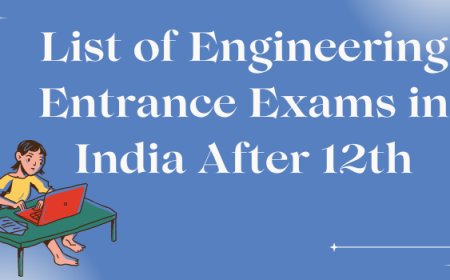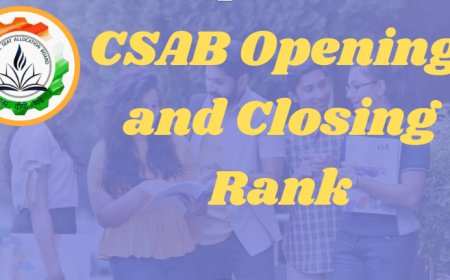JEE Mains vs JEE Advanced: Eligibility Criteria, Syllabus, and Number of Attempts
Compare JEE Main vs. JEE Advanced based on eligibility, syllabus, difficulty level, and number of attempts. Learn key differences to plan your IIT JEE preparation effectively.
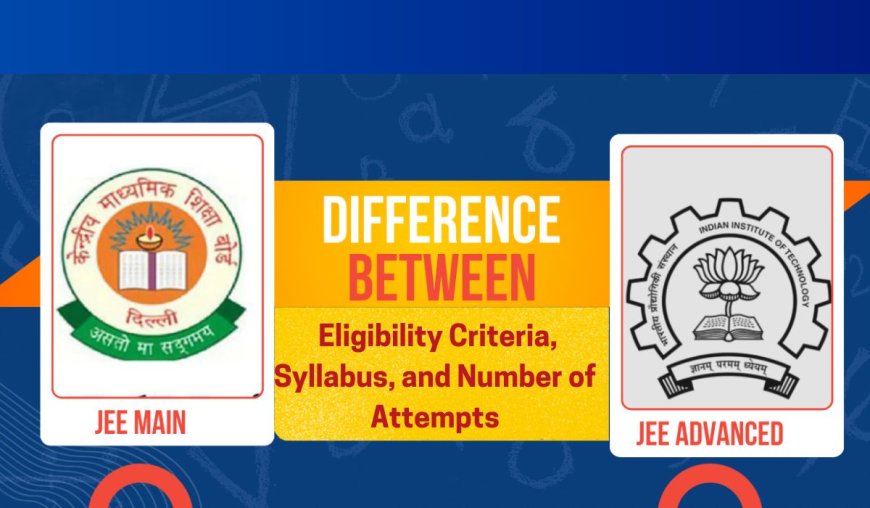
Overview of JEE Mains vs. JEE Advanced Eligibility Criteria, Syllabus & Number of Attempts :
The Joint Entrance Examination (JEE) functions as one of India's top-level engineering admission exams. The examination features a two-part structure that contains JEE Main and JEE Advanced sections. Top engineering institutes require candidates to clear JEE exams, but students must understand the distinct qualifications and study programs and unlimited testing opportunities that separate the two exams. We will assess the fundamental distinctions between the JEE Main vs JEE Advanced through this article so students can decide which exam suits them.
What is JEE Main?
Scientists from all over India must take the engineering admissions exam named Joint Entrance Examination Main, which is run through the National Testing Agency (NTA). Candidates need JEE Main 2025 qualification for admission into NITs and IIITs, together with all centrally funded technical institutions. JEE Main represents the first requirement for students who wish to take the JEE Advanced entrance exam.
Key Highlights of JEE Mains:
|
Particular |
Details |
|
Conduct Body |
National Test Agency (NTA) |
|
Name of Exam |
Joint Entrance Examination (JEE) |
|
Purpose of Exam |
Admission to IIITs, NITs, and other engineering colleges |
|
Examination Mode |
Computer-Based Test (CBT) |
|
Prevalence |
Twice in a year. |
|
Exam Duration |
3 hours |
|
Question Type |
MCQ questions, numerical questions, and aptitude. |
|
Official Website |
https://jeemain.nta.nic.in/ |
What is JEE Advanced?
JEE Advanced operates under the supervision of one of the IITs, which rotate through involvement annually. The Indian Institutes of Technology (IITs), together with some other elite institutions in India, accept this stage as the last admission requirement for their students. Students who passed JEE Main and achieved no less than 250,000 will receive the chance to sit for JEE Advanced.
Key Highlights of JEE Mains:
|
Particular |
Details |
|
Conduct Body |
IITs (Indian Institute of Technology) |
|
Name of Exam |
Joint Entrance Examination (JEE) Advanced |
|
Purpose |
Admission to IITs and other top institutes |
|
Examination Mode |
Computer-Based Test (CBT) |
|
Exam Duration |
3 Hours |
|
Eligibility |
First Qualification in JEE Main |
|
Official Website |
https://jeeadv.ac.in/ |
Read More: Download JEE Main 2025 Session 2 Admit Card – Official Release by NTA
Difference Between Jee Mains vs Jee Advanced
|
Features |
Jee Mains |
Jee Advanced |
|
Conduct of Body |
National Test Agency (NTA) |
IITs (Indian Institute of Technology) |
|
Difficulty Level |
Moderate |
High |
|
Purpose of Exam |
Admission to IIITs, NITs, and other engineering colleges. |
Admission to IITs and other top institutes. |
| Eligibility |
The student must pass the 12th class. |
The student must be in 12th grade and clear the JEE Main paper. |
|
Examination Mode |
Computer-Based (CBT) |
Computer-Based (CBT) |
|
Exam Syllabus |
Physics, Chemistry, Mathematics |
Physics, Chemistry, Mathematics. Conceptual and application-based Questions |
|
Number Of Papers |
2 (Paper 1: B.Tech Paper 2: B.Arch, B.Plan) |
2 (Paper 1, Paper 2; both Papers are compulsory) |
|
No. Of Attempts |
2 times in a year (total 6 attempts in 3 Years) |
Maximum 2 attempts. |
|
Age limit |
No Age limit |
Student must be born on or after October 1, 2000 |
JEE Main vs JEE Advanced: Eligibility Criteria
JEE Main Eligibility criteria
The NTA released updated 2025 JEE Main eligibility criteria released on the official website jeemain.nta.nic.in. The JEE admission requires candidates who have obtained their 12th-standard diploma or equivalent, combined with physics, chemistry, and mathematics as their subjects.
The admission criteria do not specify an age restriction alongside a requirement that students obtain their class 12 education in the current year or either of the previous two academic sessions.
Under JEE Main, a candidate is authorized to attend the exam up to six times, where each year the test happens twice over three years.
JEE Advanced Eligibility
Of the candidates who appear in JEE Main, only the top 250,000 rank holders are eligible to move forward.
JEE Main candidates need to finish their class 12 studies in this year or the last year.
The application criteria include a cutoff date for birth on October 1, 2000, yet SC/ST/PwD candidates benefit from a five-year allowance.
JEE Main vs JEE Advanced: Syllabus Comparison
The syllabus of JEE Advanced exceeds that of JEE Main since it contains additional complex material across physics, chemistry, and mathematics.
|
Features |
Jee Mains |
Jee Advanced |
|
Math |
Algebra, Calculus, Trigonometry, and Coordinate Geometry, etc. |
3D Geometry, Higher-level integration, Matrices, Higher-order problems, etc. |
|
Physics |
Thermodynamics, optics, electricity, mechanics, and basic topics of NCRT. |
More application-based, it involves deeper problem solving. |
|
Chemistry |
Physical chemistry, organic and inorganic chemistry, and cover all NCRT-based topics. |
Involves detailed concepts, especially in organic and inorganic chemistry. |
The assessment style between JEE Main and JEE Advanced differs fundamentally, as Main depends on NCERT understanding, yet Advanced needs conceptual applications with difficult questions that evaluate analytical competency. Thermal physics, fluid mechanics, and electrochemistry sections carry heavier weight in advanced examinations.
JEE Main vs JEE Advanced: Number of Attempts
The number of attempts for Main and Advanced exams will stay steady at two for both over the next five years. Students who aim to take JEE Main enjoy six opportunities to sit for the exam during three years, but JEE Advanced separates itself by enabling only two attempts within consecutive years. Only two opportunities exist to pass JEE Advanced since the competition remains limited for this competitive examination.
Read More: When Should You Start Preparing for JEE Main 2026? Complete Guide
Which Exam Should You Prepare For?
Your priority should be reaching the top 2.5 lakh of the JEE Main ranking because this eligibility opens the pathway to JEE Advanced for eventual IIT admissions.
JEE Main provides adequate entrance to NITs, IIITs, and state engineering colleges.
The problem-solving capabilities, together with conceptual understanding and analytical skills, are mandatory for students aiming to succeed in JEE Advanced.
JEE Main offers students who manage their time poorly a beneficial option because of its established format and straightforward questions.
Conclusion
The selection between JEE Main and JEE Advanced depends on both the students' career choices and their current preparation level. Students must pass JEE Main to gain admission into NITs and IIITs, together with other engineering colleges, but they must also succeed in JEE Advanced to enter IITs. Students need to understand the different requirements and study material before making restricted attempts to develop an effective preparation strategy. Success in these highly competitive exams depends on consistent practice together with strong fundamentals while also needing proper time management regardless of your goal between IIT and NIT admission.
What's Your Reaction?










